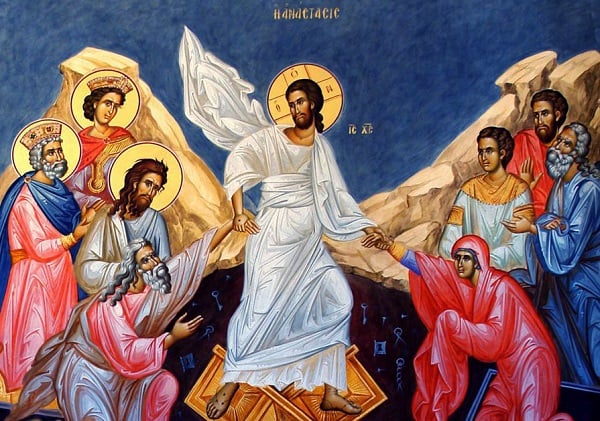We don’t want the Resurrection
12 April 2018It sounds harsh and may test the credibility of unsuspecting readers to say that we don’t want the Resurrection. If you’re blind, don’t you want your sight? If you’re sick, don’t you want to be cured? And Christ’s Resurrection is exactly this: eyes in the darkness of our blindness, health in the tormenting sickness of our mortality, the saving way out of the dead-end of the present world into the infinite and holy world of eternity, our passing from corruption into incorruption.
The Resurrection is an irrefutable event. It isn’t supported by our faith, but is the foundation and support of our faith. Two thousand years ago, the divine and human Person of our Lord, Jesus Christ, came into conflict with death and seemed to have succumbed to the fate of mortal Adam: ‘he died and was buried’. But since He was no ordinary person, Jesus Christ didn’t remain in the grave but ‘arose and was seen’. He defeated death and rose, He stood upright and alive- seen and acknowledged by many- and redeemed the human race from the dominion and fear of death.

And yet people don’t want the Resurrection. It doesn’t require much investigation nor demand much study to understand that today’s society, even if it’s supposed to be Christian, is not at all receptive towards the Resurrection of Jesus Christ. Take a look around you and you’ll see that many people are devotees of epicurean materialism, of the dogma of ‘eat, drink and be merry, for tomorrow we die’. They can see nothing beyond the gravestone because they’ve locked themselves in to the things of this world. This is why young and old panicked when the economic crisis struck. The loss, or even restriction, of the comfort and prosperity they’d been enjoying seemed unbearable, intolerable and the non-gratification of their feelings and desires equated to deprivation of their enjoyment.
In any case, the Resurrection, an event outside human experience, came under attack from people from the very beginning. It really is incredible and challenging to our way of thinking that the first and most intransigent doubters of the Resurrection were the very people you’d have expected to welcome it without question- the Lord’s own disciples. What they’d seen and experienced with Him had convinced them that He was the Messiah, but they restricted Him to their own worldly standpoint. They didn’t want the Messiah Whom the prophets spoke about, they weren’t about to accept Him as He presented Himself, humble and meek. To their way of thinking, the Messiah would have to be a mighty conqueror, an all-powerful king, an invincible ruler of the world. They were proud of Him and praised Him when He fed the crowds and when He raised dead Lazarus. How could they accept that the Messiah had died, that He had entered the tomb? So when they saw Him nailed to the Cross and then laid in the tomb, dead, they dispersed and were disheartened. It was only Jesus’ enemies who began to worry that He would rise, as He’d foretold, and they hastened to seal the tomb and set soldiers there to guard it. Against whom? Against the terrified and despairing disciples who baldly stated ‘We had hoped that he was the one to redeem Israel’? (Luke 24, 21). ‘We had hoped’, once. Now, however, their hopes were dashed, extinguished.
Yet Jesus broke the locks of Hades and rose. He Who taught the truth which sanctifies and liberates, Who revealed His divine authority through the signs, cures and resurrections He performed, now confirmed it with the sign of signs, His own Resurrection. Convinced of this by His successive appearances, the once cowardly disciples became apostles and, ‘as lions breathing fire’ delivered to the world their valid testimony that Christ had risen. So the light of hope shone out from the empty tomb of the risen Jesus. A new path opened in our life and our eternal happiness, which we tread in repentance and faith.
This is precisely the problem for people today. They don’t reject Christ. They admire His goodness and love, all the blessings He showered on the earth. It’s the Resurrection that bothers them. Had Jesus remained dead in the tomb, He’d have had most people’s sympathy. He’s unwelcome and under attack today precisely because He is risen and the announcement of His Resurrection has as its immediate consequence the requirement for our own repentance, for the rejection of the passions.
A Christ Who didn’t rise could very well be identified with the countless gods and goddesses of paganism who not only don’t forbid, but encourage the passions. But what about the risen Christ, Who declares: ‘I was dead, and behold, I am alive for ever and ever’. (Rev. 1, 18)? How can you put up with Him chastising your misdemeanours, restricting your wickedness and organizing your life? This is why so many people don’t want the Resurrection.
Source: agiazoni.gr






